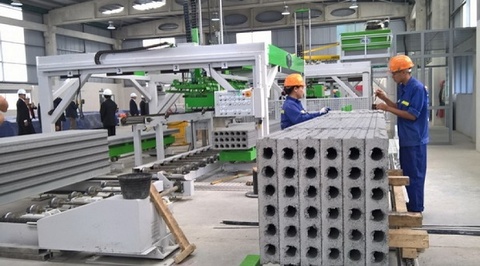
Viet Nam should increase value-added building materials products to develop the industry. — Photo baoxaydung.vn
Viet Nam should develop more new, environmentally friendly and high value-added products to build a brand to increase the value of products of Viet Nam, Deputy Prime Minister Trinh Dinh Dung has said.
Dung visited the Viet Nam Institute for Building Materials on Thursday where he discussed the development strategy plan of the local building material industry for the next 10 years and towards 2050.
According to the Ministry of Construction (MoC), the building material industry has been invested in, innovated and developed well in the past year. Some products have design capacity and output two and three times higher than they had in the last 10-15 years.
The MoC also said many local products with diverse models and better quality have been replacing imported goods and have been exported. Local materials have been exported in great numbers such as cement, clinker and construction ceramics.
Tran Ba Viet, Vice Chairman of Viet Nam Concrete Association told Vietnam News Agency: "Viet Nam is ranked fifth in the world in terms of cement production capacity, but the export value of cement is not high, while the manufacturing industry consumes much energy and resources."
Viet suggested they work to export products with much higher economic value and lower exports of clinker and cement in the near future.
Noting that building materials play an important role in construction works and infrastructure, Deputy PM Dung said there should be better investment in the industry.
“Some investment of construction materials is not rational, small-scale, dispersed while the export of construction materials still has a high content of raw materials and low added value," he said.
“New construction materials are underdeveloped, there are not many new products to meet domestic demand and yet to compete in the region and the world. In addition, research and development activities have not been paid attention to or have had ineffective investment from businesses," Dung added.
Dung also told the MoC and the institute to choose materials to export carefully to avoid losses to the nation's resources, asking them to be based on quality, standards and environmental criteria.
“In the next phase, the process of industrialisation and urbanisation will continue very strongly in Viet Nam. Therefore, the development of building materials to meet the demand for domestic construction is a critical mission," he said.
He also said there was an increasingly high demand in the world and the industry should aim to improve export value.
“We should strengthen new, environmentally friendly and high value-added materials to gradually replace traditional construction materials,” said Dung. — VNS